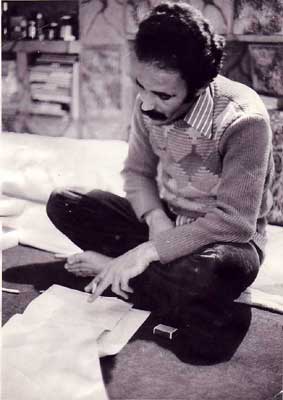Houshang Golshiri
Houshang Golshiri
Houshang Golshiri (1937-2000) was an influential Iranian writer, literary critic, and editor. He is considered one of the most prominent figures in contemporary Persian literature. Golshiri's works often explore themes of power, politics, and social issues in Iran.
Biography[edit | edit source]
Born in Isfahan, Iran in 1937, Golshiri studied Persian literature at the University of Tehran. He began his writing career as a novelist and short story writer, gaining recognition for his innovative storytelling techniques and insightful social commentary.
Golshiri was also a founding member of the Iranian Writers' Association and played a significant role in promoting freedom of expression and literary creativity in Iran. Despite facing censorship and persecution by the authorities, he continued to write and publish works that challenged the status quo.
In addition to his literary pursuits, Golshiri was a respected literary critic and editor. He contributed to various literary journals and publications, offering insightful analyses of contemporary Iranian literature and culture.
Works[edit | edit source]
Golshiri's notable works include:
- The Prince (Shahriar's biography) - The Book of Genies (A novel) - The Tomb of the Unkown Soldier (A collection of short stories)
His writing style is characterized by its rich symbolism, complex characters, and deep exploration of human nature.
Legacy[edit | edit source]
Houshang Golshiri's contributions to Persian literature have had a lasting impact on the literary landscape of Iran. His works continue to be studied and celebrated for their artistic merit and social relevance.
Golshiri passed away in 2000, but his legacy lives on through his writings and the influence he had on subsequent generations of Iranian writers and intellectuals.
Search WikiMD
Ad.Tired of being Overweight? Try W8MD's physician weight loss program.
Semaglutide (Ozempic / Wegovy and Tirzepatide (Mounjaro / Zepbound) available.
Advertise on WikiMD
|
WikiMD's Wellness Encyclopedia |
| Let Food Be Thy Medicine Medicine Thy Food - Hippocrates |
Translate this page: - East Asian
中文,
日本,
한국어,
South Asian
हिन्दी,
தமிழ்,
తెలుగు,
Urdu,
ಕನ್ನಡ,
Southeast Asian
Indonesian,
Vietnamese,
Thai,
မြန်မာဘာသာ,
বাংলা
European
español,
Deutsch,
français,
Greek,
português do Brasil,
polski,
română,
русский,
Nederlands,
norsk,
svenska,
suomi,
Italian
Middle Eastern & African
عربى,
Turkish,
Persian,
Hebrew,
Afrikaans,
isiZulu,
Kiswahili,
Other
Bulgarian,
Hungarian,
Czech,
Swedish,
മലയാളം,
मराठी,
ਪੰਜਾਬੀ,
ગુજરાતી,
Portuguese,
Ukrainian
Medical Disclaimer: WikiMD is not a substitute for professional medical advice. The information on WikiMD is provided as an information resource only, may be incorrect, outdated or misleading, and is not to be used or relied on for any diagnostic or treatment purposes. Please consult your health care provider before making any healthcare decisions or for guidance about a specific medical condition. WikiMD expressly disclaims responsibility, and shall have no liability, for any damages, loss, injury, or liability whatsoever suffered as a result of your reliance on the information contained in this site. By visiting this site you agree to the foregoing terms and conditions, which may from time to time be changed or supplemented by WikiMD. If you do not agree to the foregoing terms and conditions, you should not enter or use this site. See full disclaimer.
Credits:Most images are courtesy of Wikimedia commons, and templates, categories Wikipedia, licensed under CC BY SA or similar.
Contributors: Prab R. Tumpati, MD

